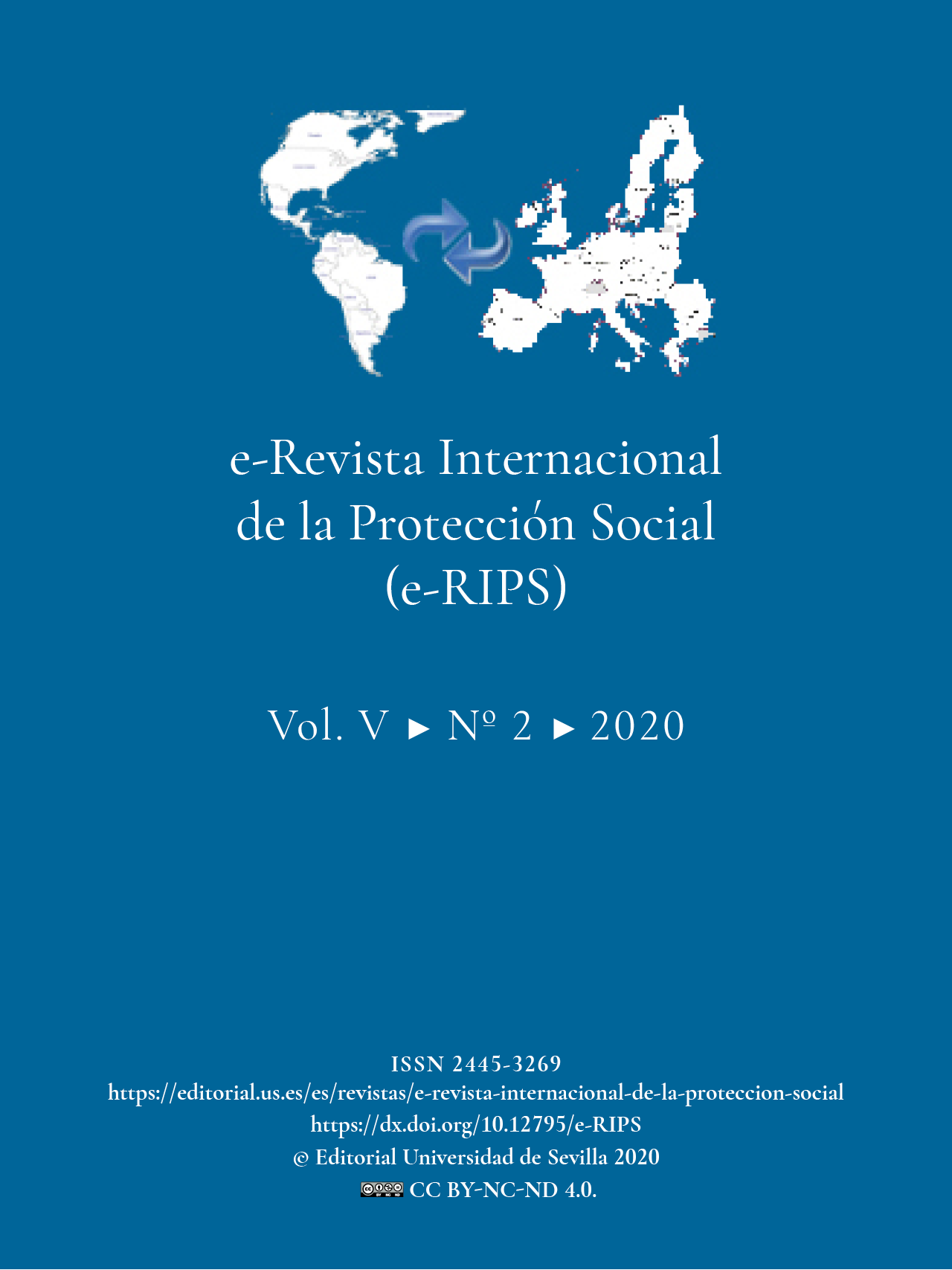EMPLEABILIDAD Y APRENDIZAJE PERMANENTE EN LA ECONOMÍA FORMAL E INFORMAL: UN ANÁLISIS DEL TRABAJO DEL FUTURO EN EL HIPERCAPITALISMO
DOI:
https://doi.org/10.12795/e-RIPS.2020.i02.14Palabras clave:
Empleabilidad; Informalidad laboral; Aprendizaje permanente; Futuro del Trabajo; OITResumen
Partiendo de la Declaración del Centenario de la OIT sobre el “futuro del Trabajo” (2019), de la Recomendación 195 de la OIT sobre el Desarrollo de Recursos Humanos (2004), de la Recomendación 204 sobre Transición del trabajo informal para el trabajo formal (2015), del Informe sobre Mujeres y Hombres en la Economía Informal (2018) y estadísticas usadas para esta normativa, este artículo analiza de forma crítica la relación entre el trabajo formal e informal del punto de vista de la empleabilidad y del aprendizaje permanente requeridos actualmente en la literatura especializada, para encontrar el perfil subyacente del “ejército industrial de reserva” de que necesita capitalismo en el futuro del trabajo de la cuarta revolución industrial.
Descargas
Citas
Antunes, R.: O privilégio da servidão. O novo proletariado de serviço na era digital, Boitempo, São Paulo, 2018.
Aranha, A. V.: Estado em ação: ideias, atores e instituições no enfrentamento da fome e da extrema pobreza no Brasil, São Paulo, Fundação Getúlio Vargas, 2019. Tesis de Doctorado.
Costa, M. S.: “Trabalho informal: um problema estrutural básico no entendimento das desigualdades na sociedade brasileira”, Caderno CRH, vol. 23, núm. 58, 2010, https://www.scielo.br/scielo.php?pid=s0103-49792010000100011&script=sci_arttext.
De Masi, D.: O ócio criativo. Entrevista a Maria Serena Palieri, Sextante, Río de Janeiro, 2012.
Fortes, R. M.: “Sobre o conceito de exército industrial de reserva”, Temporalis, Brasilia (DF), año 18, núm. 36, 2018.
Han, B.: Sociedade do Cansaço, Editora Vozes, Río de Janeiro, 2018.
Hussmanns, R.: Measuring the informal economy: From employment in the informal sector to informal employment Working Paper N. 53, Policy Integration Department Bureau of Statistics International Labour Office, Geneva, December 2004.
Innerarity, D.: Una teoría de la democracia compleja. Gobernar en el siglo XXI, Galaxia Gutemberg, Barcelona, 2020.
Knight, F.H.: “Risk, Uncertainty, and Profit” en Lee, S.: Duración del Trabajo en Todo el Mundo: Tendencias de jornadas de trabajo, legislación y políticas en una perspectiva global comparativa, Ministerio de Trabajo e Inmigración, Madrid, 2008.
Krugman, P.: Contra los zombis. Economía, política y la lucha por un futuro mejor, Crítica, Barcelona, 2020.
Lafargue, P.: Direito à Preguiça, Editora Claridad, São Paulo, 2003.
Lima, J.C.: “O trabalho digital e seus desafíos: conhecimento e condicionantes da flexibilização do trabalho”, en Tomasi, A. y Romagnoli, R. C. (orgs), Diálogos entre Trabalho e Educação: desafios contemporâneos, JADesign, Belo Horizonte, 2020.
Marx, K. y Engels, F.: Manifesto do Partido Comunista, Expressao Popular, São Paulo, 2008.
Ojeda Avilés, A. y Gutiérrez Pérez, M.: Buenas prácticas de empleo en Europa, Aranzadi, Pamplona, 2016.
Organización Internacional del Trabajo. A OIT e a Economia Informal, editada pelo Escritório da OIT em Lisboa, 2005.
Pistono, F.: Os robôs vão roubar seu trabalho, mas tudo bem: como sobreviver ao colapso econômico e ser feliz, Portafolio Penguin, São Paulo, 2012.
Rifkin, J.: O Fim dos empregos: o contínuo crescimento do desempro em todo o mundo, M. Books de Brasil Editora Ltda, São Paulo, 2004.
Schumpeter, J.: “The theory of economic development: an inquiry into profits, capital, and credit” en Lee, S.: Duración del Trabajo en Todo el Mundo: Tendencias de jornadas de trabajo, legislación y políticas en una perspectiva global comparativa, Ministerio de Trabajo e Inmigración, Madrid, 2008.
Souza, J.: A ralé brasileira, Contracorrente, São Paulo, 2018.
Standing, G.: Precariado: una carta de derechos, Capitan Swing Libros, Madrid, 2014.
Tiengo, V. M.: Rualização e informalidade: frutos do capitalismo, Appris, Curitiba, 2020.
Women and men in the informal economy: a statistical picture, Geneva, ILO, 2018, https://www.ilo.org/wcmsp5/groups/public/---dgreports/---dcomm/documents/publication/wcms_626831.pdf.
Descargas
Publicado
Cómo citar
Número
Sección
Licencia
e-Revista Internacional de la Protección Social es una revista de acceso abierto, lo que significa que todo su contenido está disponible gratuitamente para el usuario o su institución. Los usuarios pueden leer, descargar, copiar, distribuir, imprimir, buscar o enlazar con el texto completo de los artículos, o utilizarlos para cualquier otro fin lícito, sin solicitar permiso previo al editor o al autor. Esta definición de acceso abierto se ajusta a la Iniciativa de Acceso Abierto de Budapest (BOAI).
 4.0
4.0
A menos que se indique lo contrario, todo el contenido de la edición electrónica se distribuye bajo una " licencia internacional Creative Commons Atribución-Nocomercial-Compartirigual 4.0 Internacional". Puede consultar la versión informativa y el texto legal de la licencia aquí. Esto debe indicarse expresamente de esta manera cuando sea necesario.
En caso de aceptación del manuscrito, los autores ceden los derechos de la obra para su publicación a eRIPS. Revista Internacional de la Protección Social bajo el contrato de licencia Reconocimiento-NoComercial-CompartirIgual 4.0 Internacional (CC BY-NC-SA 4.0). Los autores conservan los derechos de autor y terceros están autorizados a compartir y adaptar la obra, siempre que cumplan con los términos y condiciones establecidos en la licencia.
- Usted debe dar crédito de manera adecuada , brindar un enlace a la licencia, e indicar si se han realizado cambios . Puede hacerlo en cualquier forma razonable, pero no de forma tal que sugiera que usted o su uso tienen el apoyo de la licenciante.
- Usted no puede hacer uso del material con propósitos comerciales .
- Si remezcla, transforma o crea a partir del material, debe publicar sus contribuciones bajo la misma licencia que el original.
Se puede encontrar más información en https://creativecommons.org/licenses/by-nc-sa/4.0/deed.es
Se permite y recomienda a los autores/as difundir su obra a través de Internet (p. ej.: en archivos telemáticos institucionales o en su página web) antes y durante el proceso de envío, lo cual puede producir intercambios interesantes y aumentar las citas de la obra publicada.











